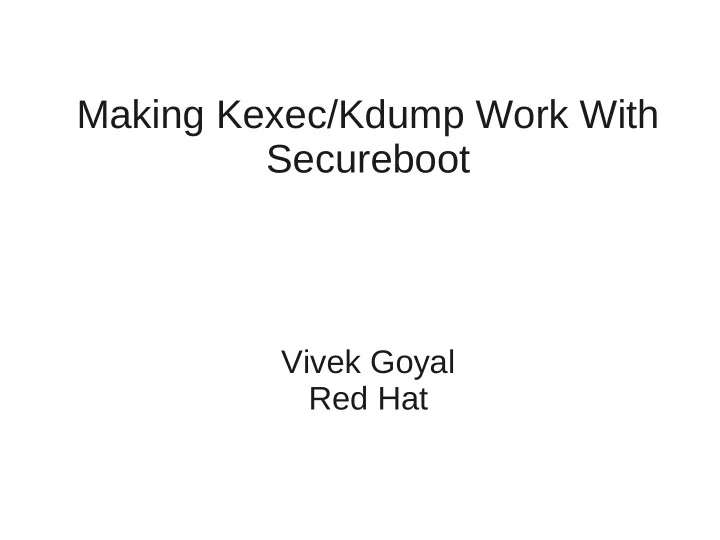

Making Kexec/Kdump Work With Secureboot Vivek Goyal Red Hat
Problem ● Secureboot says no unsigned code at privileged level 0 ● Kexec runs unsigned code at privilege level 0 ● New Kernel ● Binary blob called purgatory
Proposed Solution ● Pull /sbin/kexec into kernel ● It is almost like re-writing /sbin/kexec ● Maintain old interface and deprecate over a period of time. ● Extend secureboot trust chain to user space ● Sign /sbin/kexec and verify signature at exec() time ● Let /sbin/kexec verify signature of bzImage ● Purgatory is part of /sbin/kexec. /sbin/kexec signature verification allows us to trust purgatory.
Requirements ● Not all of the user space is signed ● Protect signed /sbin/kexec from other applications ● Disable ptrace() ● Lock down executable in memory (No swap) ● Statically linked /sbin/kexec ● Shared libraries are not signed ● Mapped shared library can be overwritten
Signature Verification ● Use IMA signatures ● Signatures stored in security.ima xattr ● Put memory locking information in security.ima ● During exec() in ELF loader ● Verify signature using bprm hook ● Map elf sections with memory locked ● Verify signature again using a new post load hook ● Store signed process info in cred. Used to deny ptrace() from unsigned processes.
A new option for keyctl() ● A kernel mechanism to verify signature of new bzImage to be loaded ● Can't trust user space unsigned crypto libraries ● Trusted system keys are in kernel keyring ● New option KEYCTL_VERIFY_SIGNATURE ● Takes user buffer and signature as input ● Calls IMA functions to verify signature of user passed buffers.
Kexec and EFI run time ● Kexec has been booting new kernel with EFI disabled. ● Kdump need to make EFI run time calls to import db keys into system_keyring ● Other kexec users want proper support on EFI ● Borislav Petkov (Suse) is working on using fixed virtual addresses (-4G) for EFI mappings.
That's It
Recommend
More recommend